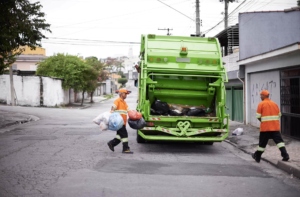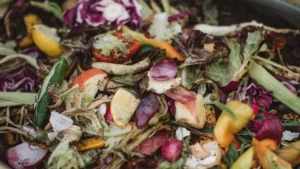5 Benefits of Organic Recycling and Why It’s Important
5 Benefits of Organic Recycling and Why It’s Important
Organic recycling is the process of converting organic waste materials into compost or other valuable products that can be used to improve soil health, reduce the amount of waste sent to landfills, and mitigate greenhouse gas emissions. Most people understand this as composting. This process is an important part of the larger effort to transition to a more sustainable and circular economy.
Organic waste includes a wide range of materials, such as food scraps, yard waste, and other biodegradable materials. When these materials are sent to landfills, they decompose in an anaerobic environment, producing methane, a potent greenhouse gas that contributes to climate change. By diverting organic waste from landfills and converting it into useful products, organic recycling can help reduce greenhouse gas emissions and mitigate the impacts of climate change.
Some individuals may compost in their homes for use in their gardens or to reduce their individual carbon footprint. However, for many businesses and organizations, it is difficult to organize these composting efforts on a large scale.
Benefits of organic recycling
- Creating valuable compost that can be used to improve soil health and fertility
Compost is a nutrient-rich soil amendment that is made by combining organic waste materials with other ingredients, such as leaves, straw, or sawdust, and allowing the mixture to decompose over time. Compost can be used to improve the structure and water-holding capacity of the soil, increase nutrient availability, and support healthy plant growth. In addition, composting can help to reduce the need for chemical fertilizers and pesticides, which can have negative impacts on soil health and the environment. This is the main benefit of composting for many home gardeners.
- Reduce the amount of waste sent to landfills
Composting and recycling organic waste means that there is less waste being sent to landfills, which can help to conserve valuable landfill space and reduce the environmental impacts associated with waste disposal. Landfills are a major source of methane emissions, which contribute to climate change and can also create safety hazards, such as the risk of explosions or fires. By diverting organic waste from landfills and converting it into compost or other products, organic recycling can help to reduce the amount of methane produced by landfills and mitigate their environmental impacts.
- Supporting local workers
Another benefit of organic recycling is its ability to create jobs and support local economies. Organic recycling facilities require skilled workers to operate and maintain the equipment used to process organic waste materials. In addition, the products produced by organic recycling facilities, such as compost and other soil amendments, can be sold to farmers, landscapers, and other customers, providing a source of income for local businesses and supporting the development of a circular economy.
- Reducing costs
Organic recycling can also help to reduce the costs associated with waste management. Landfill disposal is often expensive, as it requires significant infrastructure and ongoing maintenance. By diverting organic waste from landfills and processing it through composting or other organic recycling methods, municipalities and waste management companies can reduce their costs and potentially generate revenue through the sale of compost or other products.
- Being more environmentally friendly
In addition to these benefits, organic recycling can also contribute to broader sustainability goals, such as reducing carbon emissions and promoting resource efficiency. By transitioning to a more circular economy that values the reuse and recycling of materials, we can reduce our reliance on finite resources and create a more sustainable future for generations to come.
CheckSammy’s organics recycling
Here at CheckSammy, we take organic materials and sustainably dispose or redirect them sustainably. Our sustainability facilities are located nationwide and this scale means that there is always a sustainability facility near you. Our fleet of over 5000 drivers means that we can pick up large amounts of organic waste, regardless of your location in the U.S. or Canada. This reduces the distance that your organic waste travels from your location to an end-of-life facility. Once your organic waste reaches our sustainability facilities, it will be sustainably transformed into reusable soil.
Peanut Butter case study
Organic recycling is a great way to handle contaminated food waste, especially in large quantities. When a peanut butter company was forced to recall over 65 tons of product, they were struggling to find a sustainable disposal solution. CheckSammy was a key partner in helping them not only sustainably dispose of organic food waste, but they also managed to recycle the plastic lid jars, which never touched the tainted peanut butter.
Why choose us?
Our commitment to sustainability means that we are dedicated to helping businesses and communities nationwide with their sustainability efforts to keep unnecessary waste out of landfills.
Our easy-to-use technology makes the entire organic recycling process as easy and transparent as possible. Our Sustainability Bins have sensors that keep track of real-time fill levels and a pickup notification is sent when they are 85% full, ensuring that your bins are never overflowing. Customers can make full use of our SmartDASHBOARD to manage their accounts and generate reports anytime.
Coupled with our simple process that makes organic recycling as easy as it can be, as well as our affordable and best-in-class pricing, we are an indispensable sustainability partner for many organizations.
All in all, organic recycling is a critical part of the effort to create a more sustainable and circular economy. As we continue to confront the challenges of climate change and environmental degradation, organic recycling will play an increasingly important role in shaping a more sustainable and resilient future.
To find out more about organic recycling and how you can make your waste management more sustainable, reach out to us!
See Our Services
Create a custom solution to meet your waste and sustainability goals. Contact us today!
Continue reading
Dive deeper into the CheckSammy Blog by reading one of our posts below
Feeling the Pain of Higher Resident Turnover? Apartment Junk Removal Can Help
If you’re a property manager, you’ve probably had a significant increase in tenant turnover over the last couple of years. So it’s no wonder apartment junk removal may be top of mind for you right now. There are several reasons for this shift. For one, the housing market is on fire right now. In 2020 […]
Read MoreSetting Up a Community E-waste Recycling Program
E-waste is the fastest-growing municipal waste stream according to the EPA, yet e-waste recycling isn’t keeping pace. In fact, only 12.5% of all e-waste is recycled, reports the EPA. Starting a community e-waste recycling program is a terrific way to ensure hazardous e-waste, like lithium-ion batteries, doesn’t end up in your community’s landfill. Creating an […]
Read MoreWaste Management’s Role in the Circular Economy
Establishing a waste management program for your business or community is one of the best ways you can contribute to the circular economy. Here’s everything you need to know about waste management’s role in the circular economy (and how to get involved). What Is the Circular Economy? Our current economic model is all about taking […]
Read More5 Reasons to Consider a Textile Recycling Program for Your Organization
Americans sent more than 17 million tons of textiles to landfills in 2018, a volume that is only increasing every year, reports the Environmental Protection Agency. When you think about the fact that it can take over 200 years for textiles to decompose, it’s easy to grasp how large textile waste’s contribution is to the […]
Read More8 Benefits of Environmentally Friendly Power Washing Services
If you’re into maintaining the curb appeal of your business or home, then you’ve probably heard of pressure washing. Pressure cleaning involves using high-pressure water spray to remove grime, mold, dust, paint, mud, and other junk from objects or surfaces. Many people worry that pressure washing isn’t good for the environment, but this couldn’t be […]
Read MoreWhy Our Customers Love Our Full-Service Junk Removal
If you’re looking for full-service junk removal services, you’ve come to the right place. CheckSammy is a one-stop shop for all your junk removal and sustainability needs. From our affordability, simplicity, and unrivaled turnaround times to our innovative sustainability solutions and patented technology and data, it’s clear why some of North America’s biggest companies choose […]
Read MoreTips for a Stress-Free Move From An Eco-Friendly Junk Removal Company
What does an eco-friendly junk removal company know about moving? Quite a lot, actually. Moving can be an especially chaotic time. You have to pack everything up, get rid of unwanted items, clean your property, load everything up, and move your things to your new location. That doesn’t even include the unpacking and resettling period. […]
Read MoreCollege Junk Removal Tips for Student Move-In Day
As the new school year gears up, colleges across the country are looking for ways to clean up their campuses before the new year begins, and many of them want to do so sustainably. College junk removal isn’t easy, though, especially around move-in week—and when trying to do so sustainably. As students move in and […]
Read More8 Items Hospitality Businesses May Not Know They Can Recycle
One hotel guest produces 2.5 pounds of trash every single day. Just a single hotel room produces around one cubic yard of waste each month, which totals 200 gallons of waste per room every month. Most of this waste goes straight to the landfill, even though research shows that up to 60% of it is […]
Read More












